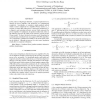Free Online Productivity Tools
i2Speak
i2Symbol
i2OCR
iTex2Img
iWeb2Print
iWeb2Shot
i2Type
iPdf2Split
iPdf2Merge
i2Bopomofo
i2Arabic
i2Style
i2Image
i2PDF
iLatex2Rtf
Sci2ools
112
Voted
ICASSP
2010
IEEE
2010
IEEE
Stability analysis of an adaptive Wiener structure
In the context of digital pre-distortion, a typical requirement is to identify the power amplifier with stringently low computational complexity. Accordingly, we consider a simple gradient method which is used to adaptively fit a simplified Wiener model, i.e., a cascade of a linear filter followed by a memoryless nonlinearity, to a dispersive and saturating reference system which represents the power amplifier. For adaptation, the gradient method only relies on the difference between the output of the reference system and the Wiener model. We show that such a structure can be formulated as a proportionate normalised least mean squares (PNLMS) algorithm. As a consequence, conditions for stability in the mean square sense can be deduced. Although not proven in a strict sense, simulation results allow to conjecture robustness.
Related Content
| Added | 06 Dec 2010 |
| Updated | 06 Dec 2010 |
| Type | Conference |
| Year | 2010 |
| Where | ICASSP |
| Authors | Robert Dallinger, Markus Rupp |
Comments (0)

